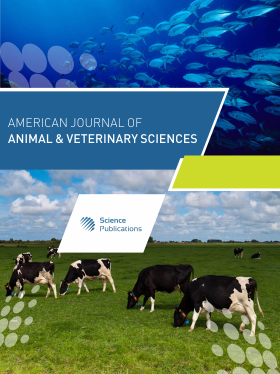Effects of Supplemental Fat to Low Metabolizable Energy Diets on Cholesterol and Triglyceride Contents of Broiler Meat
- 1 Sari Agricultural Sciences and Natural Resources University, Iran
Abstract
Problem statement: Modern diets high in Saturated Fatty Acids (SFA) and low in Monounsaturated (MUFA) and Polyunsaturated (PUFA) fatty acids are mostly blamed for the increased incidence of cardiovascular diseases. Since dietary fatty acids are absorbed by monogastric animals and deposited in their tissues without significant modification, considerable potential exists for the manipulation of the fatty acid profile of poultry meat and eggs. In the present study, effects of different sources and levels of supplemental fat to low energy diets on energy and protein intake and efficiency during grower and finisher periods and cholesterol and Triglyceride (TG) contents of breast and thigh meat of broiler chicks were investigated. Approach: One hundred and eighty 1 day old Ross 308 broiler chicks of both sexes were used for 42 days. The chicks were randomly allocated to 15 pens containing 12 chicks each with 3 replicates and assigned to receive one of the 5 dietary treatments of 2 sources (soybean oil and beef tallow) and 2 levels of fat (20 and 40 g kg-1) in a completely randomized design with factorial arrangement. There was also a control treatment (without supplemental fat) in this experiment. All chicks were fed with a commercial starter diet from 1-10 day, where-after fed with isocaloric and isonitrogenous diets. Results: There were significant differences in energy and protein intake and energy and protein efficiency among treatments in all phases of the experiment (p<0.05). Energy and protein intake was significantly higher in the chicks fed with 40 g kg-1 soybean oil that compared to other groups. The effect of different sources and levels of supplemental fat on cholesterol and TG contents of thigh and breast meat of broiler chicks in 42 day of age was significant (p<0.05). Adding 20 g kg-1 soybean oil significantly decrease levels of cholesterol in thigh and breast meat (p<0.05). The highest TG value of breast meat was observed in control chicks compared with other groups (p<0.05). Conclusion: Supplementation of broiler diets with 20 g kg-1 soybean oil improved energy efficiency, decreased cholesterol content of breast and thigh meat of broiler chicks in comparison with other groups.
DOI: https://doi.org/10.3844/ajavsp.2010.121.126

- 4,266 Views
- 4,077 Downloads
- 3 Citations
Download
Keywords
- Fat source
- meat cholesterol
- broiler chicks
- low energy diet
